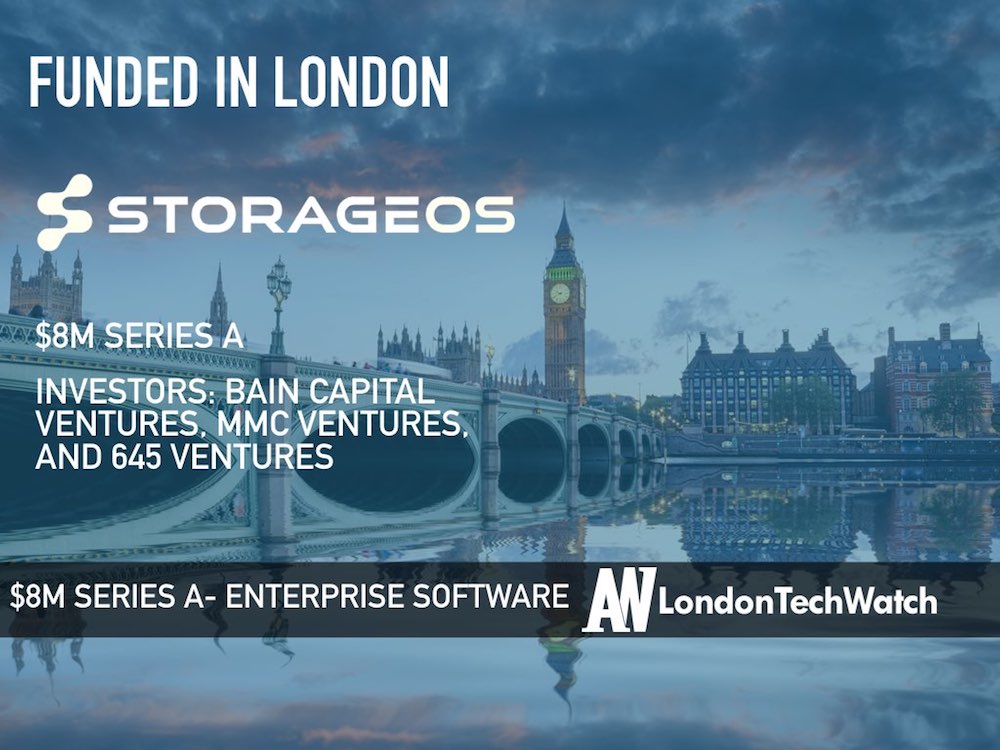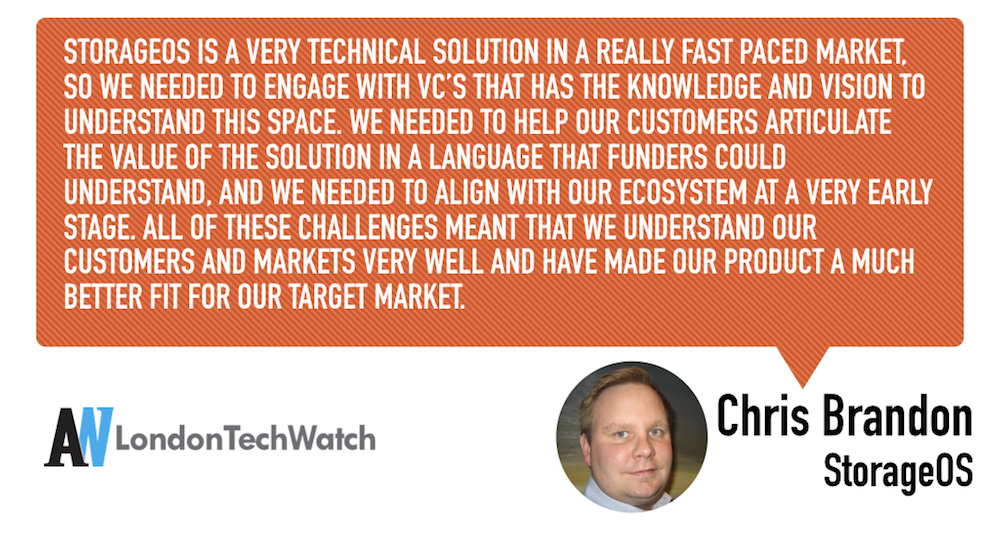
What do you think of when you hear the phrase “storage for containers”? If you think of a big cargo ship unloading at the docks, think again! Giving container storage a whole new meaning, the cloud native persistent storage platform StorageOS is helping to save time and streamline developers operations by putting storage all in one place. One of the top 25 Vendors to watch in 2016, the company aggregates storage across a cluster of machines and presents it as high availability, low latency block storage.
London TechWatch spoke with Chris Brandon of StorageOS on how its latest round of founding will help expand the company.
Who were your investors and how much did you raise?
The company announced an $8 million Series A funding round, led by Bain Capital Ventures, with participation from MMC Ventures in the UK and 645 Ventures in New York.
Tell us about your product or service.
StorageOS delivers cloud native persistent storage for containers. It natively integrates with Kubernetes, Red Hat OpenShift and Docker to deliver dynamic volume provisioning, data services, rules-based management, performance and ease of use. It works with any application, any infrastructure and any orchestrator to address container limitations by delivering an application-centric cloud native storage solution that ensures storage is presented to and continually available for applications as they move between nodes with a common management environment across on-premises and cloud platforms.
 What inspired the start of the company?
What inspired the start of the company?
This journey started for Alex Chircop, CTO of StorageOS during his many years working within enterprise organizations as technical lead for infrastructure and storage. When working with vendors, inevitably, the application and platform had to be designed around the storage solution (rather than the other way round), as the storage solutions lacked the flexibility to work with modern applications. He knew that with cloud and container technology in orchestrated environments, a new design was needed – one that was application-centric, platform agnostic, composable, API driven and self-managed, natively secure whilst providing the performance and availability that is so crucial to storage solutions. The legacy storage solutions simply couldn’t pivot fast enough to deliver what the market needed – Cloud Native Storage.
How is it different?
Unlike other solutions on the market that lack portability and flexibility, StorageOS delivers storage directly to the application and not to the infrastructure. This gives developers a unique and efficient way to operate that improves performance and decreases time to market for applications. StorageOS is also focused on delivering low latency and a small processor and memory footprint to allow companies to get more out of their cloud platforms. All of this is delivered with a storage policy automation that allows enterprises to automate placement, features, and security for their data, completely independent of the underlying infrastructure.
What market you are targeting and how big is it?
Our target market is financial services, service providers, media companies, and online retailers. The size of that market is immense.
What’s your business model?
Our customers range from SMBs to the largest financial institutions in the world. The pricing model is capacity based or node based depending on customer use cases. We have a monthly subscription SMB version, and an annual node-based subscription for the large customer. We also offer Proof of Concept engagement and full production environment for large enterprises. For the most part our customers are cloud-based but we offer an on-prem option as well.
What has changed since your last round of funding last year?
We have announced the general availability of our software-defined persistent storage platform for running containerized applications in production.
What was the funding process like?
The funding process has been a great experience. We raised a Series A, led by Bain Capital, who was part of our original seed funding round, and we’re excited to have Salil Deshpande of Bain join our board. Our main geographical focus, at the moment, is London and New York, so we’ve partnered with MMC one of the biggest VCs in London, and 645 Ventures in New York who know the NYC startup scene really well. From a strategic perspective, we feel like we’ve achieved everything we were looking to do and it allows us to invest in scaling out the team by building a New York office and the support teams that our customers need.
What are the biggest challenges that you faced while raising capital?
StorageOS is a very technical solution in a really fast paced market, so we needed to engage with VC’s that has the knowledge and vision to understand this space. We needed to help our customers articulate the value of the solution in a language that funders could understand, and we needed to align with our ecosystem at a very early stage. All of these challenges meant that we understand our customers and markets very well and have made our product a much better fit for our target market.

What factors about your business led your investors to write the check?
Storage is one of the biggest problems inhibiting container adoption. Organizations want to run stateful applications in containers and they need to solve storage before they can. StorageOS is providing an enterprise class solution for containers that organizations want today.
What are the milestones you plan to achieve in the next six months?
StorageOS is expanding. The New York headquarters will launch shortly and the team is growing. We need to help our customer move into production with our solution, and grow the team to provide the enterprise support they need to run their mission critical applications on StorageOS.
What advice can you offer companies in London that do not have a fresh injection of capital in the bank?
Stay committed to the critical factors to your success. Acute focus is crucial – the road to irrelevance is jammed with startups that spread themselves too thin. Pinpoint the essence of what your solution is and make it successful.
Where do you see the company going now over the near term?
Our near-term focus is on the success of our GA. We intend our solution to provide a competitive advantage for our customers and support enterprise organizations – specifically financial services, service providers and retailers – as they adopt containers in production for modern application development.
What is your favorite London pub to grab a pint with the team?
The is a pub near our office called the Swan that we go to every Friday night. It is run by a lovely family and the staff are really friendly. It’s a great way to end the week.


